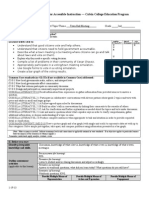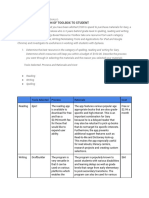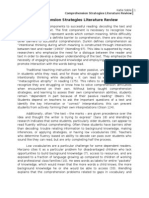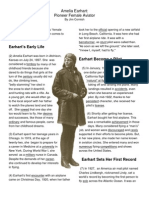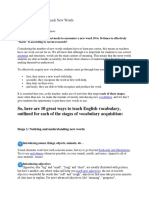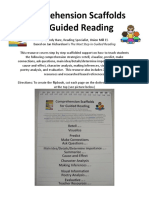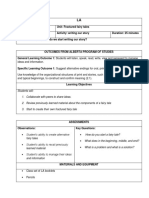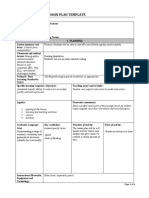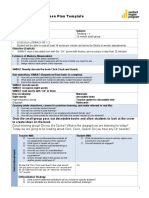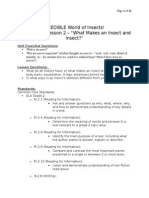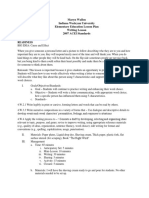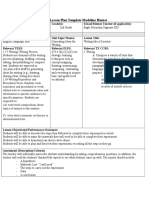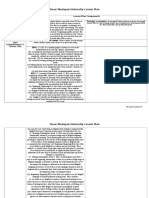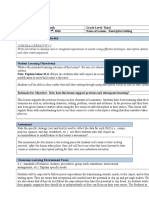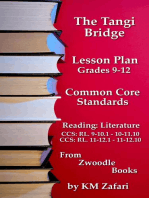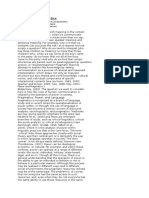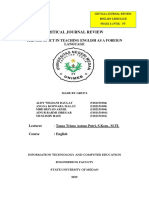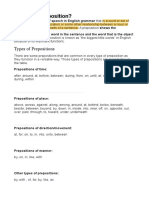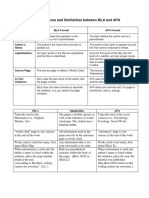Parents and Reading
Parents and Reading
Uploaded by
lanham_bCopyright:
Available Formats
Parents and Reading
Parents and Reading
Uploaded by
lanham_bCopyright
Available Formats
Share this document
Did you find this document useful?
Is this content inappropriate?
Copyright:
Available Formats
Parents and Reading
Parents and Reading
Uploaded by
lanham_bCopyright:
Available Formats
Simple Things Families
Can Do to Help Their
Child Become a Reader Washington Park
From The America Reads Challenge,
the US Department of Education Library
Read to and with your children
for 30 minutes every day. It is
1316 Broad St
very important to read out loud to Providence RI 02905
your children before they start school.
Help your children to read with you.
Ask them to find letters and words on
tel. 781-3136
the page and talk with your children
about the story.
Talk with infants and young chil-
dren before they learn to read.
Talk with your children all day long, Read and write with your chil-
using short, simple sentences. Talking dren in their native language.
with them even before they can speak Practicing their first language will help
will help them later when they learn to your children learn to read and write
read and write. English.
Help your children to read on Talk with your children as you do
their own. Reading at home helps daily activities together. When you
children do better in school. Have lots take your children places, talk with
of children's books in your home and them about what you are doing and
visit the library every week. Help your ask them questions. If your child can-
children get their own library cards not hear, use whatever form of com-
and let them pick out their own books. munication your child usually uses.
Help your child to see that read- Ask your children to describe
ing is important. Suggest reading as events in their lives. Giving detailed
a free-time activity. Make sure your descriptions and telling complete stories
children have time in their day to helps children learn about how stories
read. Set a good example for your are written and what the stories they
children by reading newspapers, read mean.
magazines, and books. Restrict the amount and kind of TV
Set up a reading area in your your children watch. Watch educa-
home. Keep books that interest your tional TV programs with your children
children in places where they can eas- that teach letter sounds and words or
ily reach them. As your children be- give information about nature and sci-
come better readers, make sure that ence.
you add harder books to your collec- Keep track of your children's pro-
tion. gress in school. Visit your children's
Give your children writing materi- classrooms to learn how your children
als. Children want to learn how to are doing in school and how you can help
write and to practice writing. Help your children become better students.
them learn by having paper, pencils, Ask about the school's reading program
pens, or crayons for them in your and where your children need help.
home. Help your children write if they
ask you. Copyright 2009, US Department Of
Education
Your Young Reader (ages 5-8)
From kindergarten through third grade, you may
see tremendous growth in your child's literacy de-
velopment. While your child may receive a lot
of educational guidance from teachers, remember
that you play a major role in your child's success in
reading and writing at every stage of development.
Your beginning reader
(grades K-2)
Let your child gradually share some of the read-
ing aloud. You read a sentence, paragraph, or
page, then it’s your child’s turn. Take over if your
beginner seems tired or discouraged to ensure that
reading is always fun, not just hard work.
If your child can’t sound out a word, suggest 781.3136
skipping it, reading the rest of the sentence, and
deciding what word would make sense.
Leave notes on the refrigerator or in a lunch bag
for your child to discover and read.
Take your new reader to the library to sign up for Your Independent Reader
his or her own library card.
Try introducing the following types of (ages 9-12)
books to your child: A child in grades four through six has
probably mastered basic reading skills
Read-aloud books with plots to follow and chal- and can read independently for pleas-
lenging vocabulary ure. This is a great time for you to keep
Easy-to-read books your child can read alone encouraging and motivating your child
to read more often. And don't forget the
Books in a variety of genres, including nonfiction importance of reading aloud to your
and poetry
child and participating in reading- and
Your developing reader writing-related family activities.
(grades 2-3) Continue reading aloud books that
When your children read aloud, help them catch challenge your child’s listening vocabu-
and correct their own mistakes by asking guiding lary and thinking skills. Reading books
questions. For example, you might ask, “Does that that are above your child’s reading level
word really make sense here? What letter does it will help him or her grow as a reader.
start with? What do you think the word could be?” Encourage your child’s independent
Talk about the books you read together and reading by providing a steady flow of
about the books your children are reading on their books and conversation about them.
own. Help children who seem to lose interest
Don’t stop reading aloud! Developing readers can in reading find the time to read at home
read simple chapter books alone, but they still for pleasure. Make sure that their lives
need you to help read the kinds of books that will haven’t become overly scheduled.
challenge their thinking and build their vocabulary. Help your children find more reasons to
write. Enlist them in taking messages,
Suggest that your child read to a younger making the shopping list, writing letters,
brother, sister, or neighbor. It will be good prac- and answering email.
tice, a chance to show off skills, and an inspiration Try introducing the following types
for the younger listener. of books to your child:
Try introducing the following types of
books to your child: Classic fiction and other more recent
novels to read aloud together
Novels for “middle readers” that you can read
aloud together Longer chapter books for “middle read-
ers”
Information books for young readers
Books in a variety of genres, including biographies, Books in a variety of genres, including
humorous stories, and poetry biography, fiction, nonfiction, and poetry
Tips for Reading Aloud
With Elementary-
School Children
Reading aloud to your chil-
dren means they can:
Continue to associate reading with warm,
pleasant feelings; learn about words and
language; build listening skills; expand vo-
cabularies; talk about the characters, set-
tings, and plot then relate them to their own
lives; gain knowledge about a variety of top-
ics.
Gain exposure to a variety of writing styles 781.3136
and structures.
Explore social and moral issues and behav-
iors.
Become more skilled independent readers.
Discover which authors and writing styles
they like.
Be motivated to read on their own.
Choose books that elemen-
tary-school children like: Try these read-aloud
Children are becoming independent read- tips:
ers. Read easy readers that they can reread Set the stage before you begin reading.
on their own.
Discuss what you read yesterday and
Children are expanding their language what might happen next. Take turns
skills, vocabulary, and attention spans. Read reading aloud; for example, each of you
chapter books with developed characters, can read a page in an easy reader.
plot twists, and descriptive language. Use the tips for younger children that
Children are learning to monitor their own are also appropriate for this age group.
behavior. Read longer picture books and Defer questions until after you finish
chapter books with messages about how to
reading, if possible. This helps children
handle problems and cope with difficulties. get fully engaged in listening to a story.
Children are curious about the world be- Summarize, adapt, or skip parts of
yond their immediate experiences. Read ref-
books that are too far above a child's
erence books that match their interests.
level of understanding.
Children sometimes identify with characters Relate a book you are reading to one
and situations. Read series books featuring
read in the past. Talk about how they are
the same characters engaged in new experi-
alike and how they differ.
ences.
Children begin to pay attention to current Ask a child to imagine what he or she
might do in a situation similar to that
events. Read junior versions of popular
faced by a character.
magazines, such as Sports Illustrated for
Kids, and topical magazines written for chil- Provide materials and activities that let
dren, such as Ranger Rick. children expand their understanding of a
character, historical event, or situation.
Children develop special interests, pre-
ferred types of books, and favorite authors. Talk about what you have read. Books
Read some books that match the child's often evoke strong feelings that need to
preferences--mysteries, science fiction, ad- be shared. Offer your reactions and invite
venture stories, anything Beverly Cleary-- a child to do the same.
and some you love that will introduce some- Stop reading at a suspenseful point in
thing or someone new. the book. This encourages a child to be
eager for tomorrow's read-aloud.
Here are tips for great
summer reading offered by
Reading Is Fundamental
and our library:
Visit the library. If your child doesn't have a
library card, definitely sign them up for one now!
Books are free to borrow, and so are dvds, and
your child can join a reading club.
Lead by example. Let your kids see you reading.
Kids who see their parents reading are the most
likely to be good readers themselves and to think
that reading is cool.
Talk it up. Talking with your kids about what you 781.3136
781.3136
read lets them know that reading is an important
part of your life. Encourage your kids to ask ques-
tions about what you read and to talk about their
reading.
Make reading more fun in the summer. When Some current ideas about kids
kids don’t have classes, they have time to read all
kinds of other things for fun. Let kids choose and reading:
books for fun. And let them stay up a little later if
they want to keep reading. A lot of experts think that reading shouldn’t
be a chore that’s imposed on kids, and that
Have plenty of different things to read kids who see reading as fun make better
around. Not just picture books and fiction, but readers. Experts suggest having a straight-
non-fiction, newspapers, and magazines. forward conversation with your kids about
summer reading.
Read aloud with kids. And practice reading
by reading aloud wherever you are. Read Lynne Vallone of Texas A&M University says
billboards and traffic signs from the car, read to ask your kids “what goals they have for
the menu in a restaurant, or anything else you reading this summer. The parent and child
see. can together set goals, and then the parent
can reward the child for reaching those
Read the same book your child is reading goals." She thinks a good reward is to set
and discuss it. This is a great way to enjoy read- aside a budget to buy books for your home.
ing together. Ask your librarian for books that will This makes kids feel like books are a natural,
work well for different ages and genders. valuable and important part of your life.
Let kids choose what they want to read, and Finding books your kids will like and which
don't turn your nose up at popular fiction. will motivate them to want to read is easier
if you talk to your kid’s teacher and a librar-
Try a book on tape for a change. Your library ian. A teacher can tell you what reading level
can order some for you to try; your child can just your child is at, and what kind of subjects
listen, or can also get the book and read along. s/he responds to in class. A librarian can
recommend and provide books that match
Read a book and see the movie made from your kid’s reading level and interests.
it together.
If you think a book might be too hard for
Share your favorite childhood books with your kid, ask them to read a paragraph out
your kids. aloud. If they’re reading aloud pretty confi-
dently, they should be fine reading it to
Make a library area in your house with a themselves. If your child wants to read a
shelf to keep track of library books. book that is above their reading level, it’s an
opportunity to work with them to help them
Fill a backpack with books for your kids and improve their skills.
take it anywhere they might want to b
read. If you think your child is choosing books that
aren’t challenging them, try choosing more
Write a list to take to the library, so your difficult books for the two of you to read to-
librarian can order the exact books you want for gether. There are no grades in summer read-
your next visit. ing and it’s a good time for kids to explore
both easy and hard books and ideas.
You might also like
- Social Studies Lesson PlanDocument1 pageSocial Studies Lesson Planapi-380973676No ratings yet
- Lesson Planning Form For Accessible Instruction - Calvin College Education ProgramDocument5 pagesLesson Planning Form For Accessible Instruction - Calvin College Education Programapi-300180062No ratings yet
- Observation 4 Reading Lesson PlanDocument2 pagesObservation 4 Reading Lesson Planapi-336922068No ratings yet
- Talking About My Family: SpeakingDocument33 pagesTalking About My Family: SpeakingARMANDO JR100% (1)
- EMPOWERgmat Reading ComprehensionDocument5 pagesEMPOWERgmat Reading ComprehensionAnurag KumarNo ratings yet
- Part Two: Application of Toolbox To StudentDocument4 pagesPart Two: Application of Toolbox To StudentNinaNo ratings yet
- Lesson Template 1 - Using TextDocument18 pagesLesson Template 1 - Using TextPaola Diamante BrillanteNo ratings yet
- Guided Reading - Dra AssignmentDocument7 pagesGuided Reading - Dra Assignmentapi-286060600No ratings yet
- Comprehension Strategies Literature ReviewDocument5 pagesComprehension Strategies Literature ReviewScott LapointeNo ratings yet
- Basic Information Grade Level: 10 Subject: Humanities Length of Class: 90 Minutes The Big IdeasDocument5 pagesBasic Information Grade Level: 10 Subject: Humanities Length of Class: 90 Minutes The Big IdeasJettNo ratings yet
- Task 1 Context For LearningDocument3 pagesTask 1 Context For Learningapi-281655851No ratings yet
- Observation Lesson Plan Guided ReadingDocument6 pagesObservation Lesson Plan Guided Readingapi-251846340No ratings yet
- Amelia Earhart - Pioneer Female Aviator by Jim CornishDocument9 pagesAmelia Earhart - Pioneer Female Aviator by Jim Cornishalon0023368No ratings yet
- Toolbox FinalDocument13 pagesToolbox Finalapi-268585214No ratings yet
- Social Studies Lesson For Observation - 2Document10 pagesSocial Studies Lesson For Observation - 2api-355029253No ratings yet
- Comprehension Toolkit 1Document3 pagesComprehension Toolkit 1api-510893209No ratings yet
- Kayla Taylor New8 Student TeachingDocument2 pagesKayla Taylor New8 Student Teachingapi-407875476No ratings yet
- Guided Reading Lesson PlanDocument2 pagesGuided Reading Lesson PlanamypeabodyNo ratings yet
- Reading Lesson Plan Allison Schie UNIT BIG IDEA: Making Something Great Out of What We Have Lesson RationaleDocument8 pagesReading Lesson Plan Allison Schie UNIT BIG IDEA: Making Something Great Out of What We Have Lesson Rationaleapi-351448195No ratings yet
- 3rd Grade Geometry Unit PlanDocument7 pages3rd Grade Geometry Unit PlanalyssamanningNo ratings yet
- Thematic UnitDocument43 pagesThematic Unitapi-437974951No ratings yet
- Guided Reading LessonDocument6 pagesGuided Reading Lessonapi-285987803No ratings yet
- Basic Productivity Tools LessonDocument2 pagesBasic Productivity Tools Lessonapi-517070198No ratings yet
- Lesson Plans WK 26Document7 pagesLesson Plans WK 26api-280840865No ratings yet
- Three Little Pigs.: Lesson Plan OutlineDocument6 pagesThree Little Pigs.: Lesson Plan Outlineapi-271049245No ratings yet
- Big Ideas Essential Questions: Seton Hill University Lesson Plan Template Name Subject Grade Level Date/DurationDocument4 pagesBig Ideas Essential Questions: Seton Hill University Lesson Plan Template Name Subject Grade Level Date/Durationapi-266477631No ratings yet
- 5th Grade Language Arts Lesson Plan 2Document2 pages5th Grade Language Arts Lesson Plan 2api-273757216No ratings yet
- 10 Fabulous Ways To Teach New WordsDocument3 pages10 Fabulous Ways To Teach New WordskangsulimanNo ratings yet
- GR Comprehension Scaffolds by W. HareDocument29 pagesGR Comprehension Scaffolds by W. HareLK100% (2)
- Personal Narrative Lesson Plan 5th GradeDocument2 pagesPersonal Narrative Lesson Plan 5th Gradeapi-252519456No ratings yet
- Faculty Development Training: University of La SaletteDocument10 pagesFaculty Development Training: University of La SaletteSeth De Leon MendozaNo ratings yet
- Fractured Fairy Tale 4Document3 pagesFractured Fairy Tale 4api-336692559No ratings yet
- Actual Lesson PlanDocument3 pagesActual Lesson Planapi-316010145No ratings yet
- Commonlessonplan 1Document5 pagesCommonlessonplan 1api-339766523No ratings yet
- Differentiated Lesson Plan Template Reading SkillsDocument6 pagesDifferentiated Lesson Plan Template Reading Skillsapi-597970375No ratings yet
- Insects Unit Plans FinalDocument10 pagesInsects Unit Plans Finalapi-242670412No ratings yet
- Lesson Plan Ell-Added AssessmentsDocument8 pagesLesson Plan Ell-Added Assessmentsapi-307141452No ratings yet
- Reading Fluency LessonsDocument11 pagesReading Fluency Lessonsapi-310225789No ratings yet
- American Indian Tribes: 3rd GradeDocument72 pagesAmerican Indian Tribes: 3rd Gradeapi-349474344No ratings yet
- Sequence Text StructureDocument2 pagesSequence Text Structureapi-346123027No ratings yet
- Metacognitive Overview/Introductory Unit of StudyDocument8 pagesMetacognitive Overview/Introductory Unit of Studyashleyp14No ratings yet
- Child Ado Lesson PlanDocument16 pagesChild Ado Lesson PlanGracelyn EsagaNo ratings yet
- Lesson Plan 1 Insects TaughtDocument11 pagesLesson Plan 1 Insects Taughtapi-270233181No ratings yet
- Lesson Foundation: Title and # Within Unit Grade LevelDocument4 pagesLesson Foundation: Title and # Within Unit Grade Levelapi-344731850No ratings yet
- rl5 Lesson Plans 1-3Document11 pagesrl5 Lesson Plans 1-3api-412552907No ratings yet
- BYU-Idaho Preschool Lesson PlanDocument9 pagesBYU-Idaho Preschool Lesson Planapi-412703399No ratings yet
- Module 4 Literacy 5 Day Lesson PlanDocument11 pagesModule 4 Literacy 5 Day Lesson Planapi-288345162No ratings yet
- Millicent Atkins School of Education: Common Lesson Plan TemplateDocument7 pagesMillicent Atkins School of Education: Common Lesson Plan Templateapi-332459220No ratings yet
- Finding The Main Idea Activity PDFDocument4 pagesFinding The Main Idea Activity PDFdevyandraNo ratings yet
- Intrapersonal CommunicationDocument37 pagesIntrapersonal Communicationdiannedelacruz1No ratings yet
- Literature Methods - Writing LessonDocument4 pagesLiterature Methods - Writing Lessonapi-400787901No ratings yet
- Edre 4860 - Writing Madeline Hunter Lesson Plan 2Document11 pagesEdre 4860 - Writing Madeline Hunter Lesson Plan 2api-341164847No ratings yet
- Independent Lesson Plan - Jada GriggsDocument4 pagesIndependent Lesson Plan - Jada Griggsapi-345771743No ratings yet
- Texas Wesleyan University Lesson Plan: Domain-DimensionsDocument4 pagesTexas Wesleyan University Lesson Plan: Domain-Dimensionsapi-340630807No ratings yet
- Lesson 3 Descriptive SettingDocument8 pagesLesson 3 Descriptive SettingAnonymous Z9zcD6BzNo ratings yet
- Group Members/Group Name: Thematic Unit Theme: Lesson 2 Title: Grade Level: Group Weebly Space AddressDocument8 pagesGroup Members/Group Name: Thematic Unit Theme: Lesson 2 Title: Grade Level: Group Weebly Space Addressapi-402126047No ratings yet
- Katylough Hunter Lesson Plan1 FallDocument13 pagesKatylough Hunter Lesson Plan1 Fallapi-273449167No ratings yet
- INTRODUCTION TO EDUCATION (FOUNDATIONS OF): Passbooks Study GuideFrom EverandINTRODUCTION TO EDUCATION (FOUNDATIONS OF): Passbooks Study GuideNo ratings yet
- English Language, Literature and Creative Writing: A Practical Guide for StudentsFrom EverandEnglish Language, Literature and Creative Writing: A Practical Guide for StudentsNo ratings yet
- Power and PragmaticsDocument6 pagesPower and PragmaticsAlexandra Mironescu100% (2)
- German Verbs WikiDocument14 pagesGerman Verbs WikiDorjgotov AriunbayasgalanNo ratings yet
- Tyler & Wheeler Curriculum ModelDocument8 pagesTyler & Wheeler Curriculum Modelliliyayanono100% (2)
- CJR B Ing Kelompok 6Document10 pagesCJR B Ing Kelompok 6Muslimin hadi wibowoNo ratings yet
- Dementia FrontotemporalDocument24 pagesDementia FrontotemporalTeologia GamalielNo ratings yet
- Thinking Fast and Slow by Daniel Kahneman - Book Summary & PDFDocument19 pagesThinking Fast and Slow by Daniel Kahneman - Book Summary & PDFBomber Killer100% (1)
- Classroom Behavior and Academic Performance of Public Elementary School PupilsDocument34 pagesClassroom Behavior and Academic Performance of Public Elementary School PupilsDhave Guibone Dela CruzNo ratings yet
- Advanced English Vocabulary 123Document3 pagesAdvanced English Vocabulary 123RaheelAfzaalNo ratings yet
- English Oral TestDocument15 pagesEnglish Oral TestNAI 38 Nageswara RaoNo ratings yet
- School ProfileDocument4 pagesSchool Profileapi-316666723No ratings yet
- History of Industrial PsychologyDocument22 pagesHistory of Industrial PsychologyDebojyoti Roy100% (1)
- Countries and NationalitiesDocument3 pagesCountries and NationalitiesGladys Angelit Benites MoyaNo ratings yet
- I Don't Like Big Cities 2: Likes and DislikesDocument3 pagesI Don't Like Big Cities 2: Likes and DislikesMsa SultanNo ratings yet
- 9607 w21 Ms 4 PDFDocument13 pages9607 w21 Ms 4 PDFMoiz KhanNo ratings yet
- Movie Recommendation System: Using Machine LearningDocument7 pagesMovie Recommendation System: Using Machine LearningYash kumarNo ratings yet
- Australian Government Generative AI and IP Rights 1684547472Document30 pagesAustralian Government Generative AI and IP Rights 1684547472Clau Villalobos MoralesNo ratings yet
- Zlib - Pub Real Real English Authentic Learning Grammar Book Teachers Edition 2Document148 pagesZlib - Pub Real Real English Authentic Learning Grammar Book Teachers Edition 2ArailymNo ratings yet
- Case Study Effects of Applying The Mother Tongue To Teaching Techniques FinalDocument6 pagesCase Study Effects of Applying The Mother Tongue To Teaching Techniques Finalghela00No ratings yet
- Main Differences and Similarities Between MLA and APADocument2 pagesMain Differences and Similarities Between MLA and APAKyla LacasandileNo ratings yet
- Paragraph Writing UnitDocument5 pagesParagraph Writing Unitapi-531818346No ratings yet
- Badiou - Existence and DeathDocument11 pagesBadiou - Existence and DeathDaniel RedNo ratings yet
- AI in CNC MachiningDocument8 pagesAI in CNC MachiningSung TanNo ratings yet
- Ross Jeffries - Flash CardsDocument5 pagesRoss Jeffries - Flash CardsCDamionHarper100% (5)
- The 4 Stages of Cognitive DevelopmentDocument10 pagesThe 4 Stages of Cognitive DevelopmentDevera GinalynNo ratings yet
- Artificial Intelligence in Manufacturing PDFDocument12 pagesArtificial Intelligence in Manufacturing PDFFabian OrozcoNo ratings yet
- Guided Reading Plan Template Notes Parts 1-5 Sum20 1Document3 pagesGuided Reading Plan Template Notes Parts 1-5 Sum20 1api-516555168No ratings yet
- Falar... Ler... Escrever... Português Um Curso para Estrangeiros (Etc.)Document7 pagesFalar... Ler... Escrever... Português Um Curso para Estrangeiros (Etc.)epiepiphanieNo ratings yet
- Changes As Per Reporting VerbDocument5 pagesChanges As Per Reporting VerbMithun BiswasNo ratings yet

